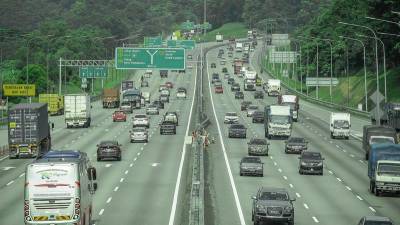PETALING JAYA: Thirty-seven lives lost in Genting Highlands. Fifteen students killed in Gerik. A baby crushed at Kajang. In all these road tragedies, not one transport company has been prosecuted for negligence.
Road safety and sustainable transport activist Shahrim Tamrin said Malaysia’s long list of deadly crashes exposes a culture of impunity, in which operators and directors escape accountability while grieving families are left
with no justice.
“It is time for the authorities to stand firm and adopt zero compromise against operators or transport companies by hauling them to court each time a commercial vehicle crash records death and injury involving other road users.”
The call comes after two recent incidents: a one-year-old boy died when a lorry ploughed into vehicles at the Kajang Toll Plaza in Selangor and a driver perished when a trailer rammed into six vehicles.
Shahrim said despite safety codes such as iCOP SHE introduced by the former Land Public Transport Commission and now under the Road Transport Department (RTD), no company or director has ever been charged in court for negligence, even in cases involving mass fatalities.
“I have also sought court documents and requested confirmation from the authorities and the answer was shocking.
“For the record, until this media statement was released, no rail and road transport companies have been (brought) to court during the transport commission era.”
Among the deadliest crashes on record are the 2013 Genting Highlands bus tragedy, which claimed 37 lives and the Gerik tour bus accident four months ago that killed 15 Universiti Pendidikan Sultan Idris students.
“To the best of my knowledge, according to the Land Public Transport Act 2010 and in the permit regulations along with the iCOP SHE safety code, transport companies can be subjected to court action for negligence or failure to comply with safety guidelines.
“However, I was informed by several high-ranking government officials that the prosecution of companies is complex due to the legal complications including lack of clear findings and the absence of a specific charge.”
Shahrim urged the Transport Ministry and the Cabinet-level Road Congestion and Safety Committee to show political will by ending the excuses and prosecuting negligent operators.
“Now is the right time for the authorities to (bring) negligent transport operators to court. I believe the public is jaded by the repeated formation of committees while the deaths and injuries of road users continue to escalate due to the lack of firm action by the government.”
Meanwhile, Road and Transportation Safety Association president Md Hairolazaman Muhamed Nor said repeated fatal crashes involving heavy vehicles point to systemic failures in enforcement and regulation.
He said enforcement remains reactive instead of preventive, adding that more than 60% of commercial vehicle operators recently failed safety audits due to malfunctioning GPS monitoring systems and poor compliance with iCOP.
“Fragmented oversight between agencies such as the RTD and the Land Public Transport Agency, coupled with weak legal mechanisms, has allowed systemic safety lapses to persist despite routine inspection requirements.”
He said there is growing consensus among legal experts, policymakers and civil society that Malaysia needs corporate manslaughter laws to hold company directors accountable for systemic negligence.
“Existing laws mainly target individual drivers, while operators and directors often escape liability despite issues such as poor maintenance, excessive working hours and lax safety standards. The absence of a corporate manslaughter provision leaves a gap in which corporate negligence is unpunished.
“Recent high-profile fatal crashes have sparked renewed calls for the introduction of a Corporate Manslaughter Act from influential figures, to ensure that the entire organisation, including board members and CEOs, could be prosecuted for gross negligence leading to death.”
He added that accountability must shift from individual drivers
to company boardrooms through such an Act, to compel systemic safety reforms and deter corporate negligence.
